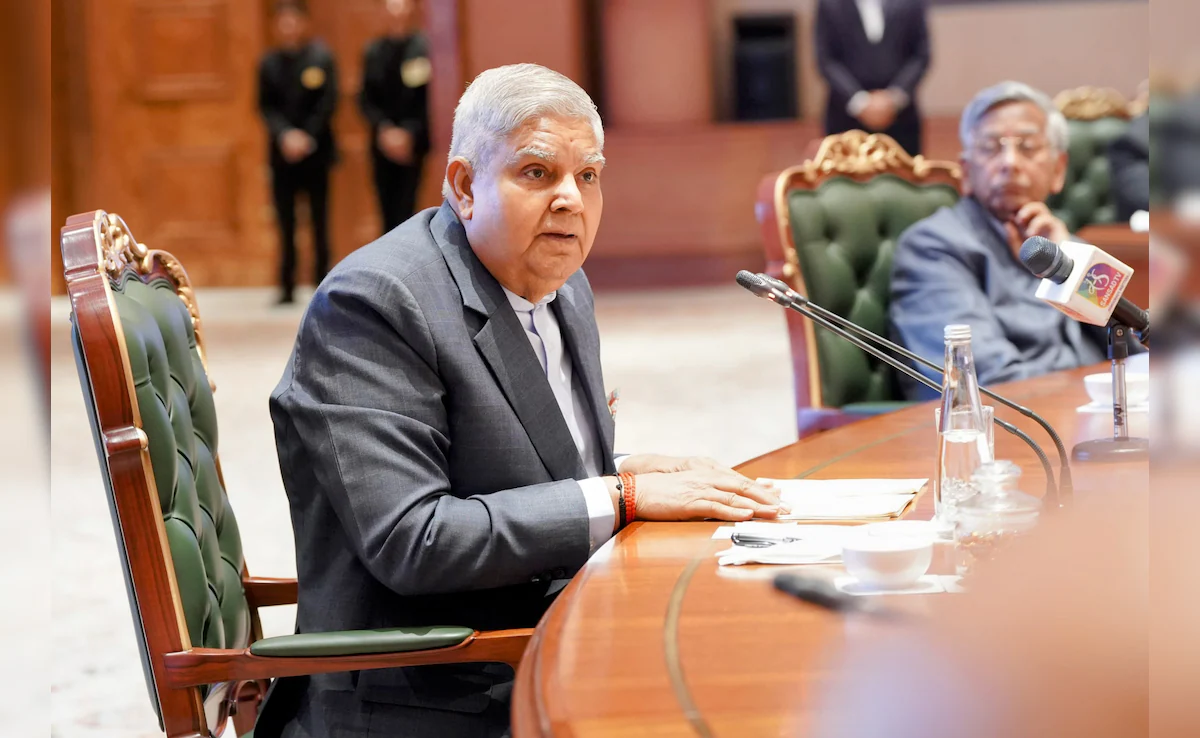New Delhi in Turmoil: The Events Behind the Sudden Resignation of the Vice President
In a surprising turn of events, Vice President Jagdeep Dhankhar announced his resignation on July 22, 2025, leaving political circles buzzing with speculation. His departure from the high office came amidst a backdrop of political confrontations and controversies, particularly surrounding allegations of judicial corruption. It seems that a motion backed by the Opposition to remove a judge, which unfolded immediately before his resignation, played a pivotal role in this dramatic political exit.
The context of Dhankhar’s resignation is intertwined with the unfolding political dynamics in India. The Vice President’s resignation letter, which he addressed to President Droupadi Murmu, cited health concerns as the key reason for his abrupt decision. The timing of his exit raises questions about whether there were deeper underlying issues, as political analysts scramble to decipher the implications of his departure on the current government and the upcoming parliamentary sessions.
Based in the capital, New Delhi, Jagdeep Dhankhar’s resignation has not gone unnoticed by political observers. It follows a tumultuous exchange between him and government officials, centering on a contentious motion aimed at removing Justice Yashwant Varma, whose recent cash recovery case has sparked outrage. The political tension reached a boiling point when Dhankhar accepted the Opposition’s notice for a motion, which was promptly followed by a stern call from the Centre, indicating discontent with his handling of the situation.
The Root Cause: A Judicial Controversy and Political Tensions
The catalyst for Vice President Dhankhar’s resignation can be traced back to the Opposition’s motion against Justice Varma. This motion gained traction when a significant amount of cash was discovered at the judge’s official residence, prompting public outcry and demands for accountability. The Opposition, eager to seize this moment, moved the notice just as the Monsoon Session of the Rajya Sabha commenced. Dhankhar, serving as the Chairman of the Upper House, accepted the notice, a decision that reportedly displeased the government.
As per the report by NDTV, the phone call that followed between Dhankhar and the Centre escalated quickly, leading to sharp exchanges regarding the Vice President’s role and authority. The situation grew tense, with both sides exchanging points of contention. The outcome of this heated dialogue appeared to signal a brewing storm, with whispers of a possible no-confidence motion against Dhankhar surfacing soon after.
Despite these political undercurrents, the Vice President’s resignation letter emphasized his gratitude for the support he received during his tenure. Dhankhar expressed appreciation to the President and Prime Minister, reflecting on the invaluable experiences gained while serving in a unified democracy. However, the abrupt nature of his resignation—following only a phone call and without a farewell address—has left many questioning whether political pressures were the real driving force behind his decision.
Political Fallout: Reactions and Implications
The immediate aftermath of Dhankhar’s resignation sent shockwaves through India’s political system. Prime Minister Narendra Modi expressed well wishes for Dhankhar’s health, acknowledging his contributions to the nation. Yet, within political circles, reactions were mixed. Senior Congress leaders described the resignation as “inexplicable” and shrouded in “mystery.” The absence of key Union Ministers during a critical meeting also raised eyebrows, leading to speculation about the internal dynamics within the government that may have contributed to the Vice President’s premature exit.
As debate rages, Congress President Mallikarjun Kharge noted that only Dhankhar could shed light on the circumstances surrounding his resignation. The party continues to emphasize that the government holds the responsibility to clarify the situation. Observers have highlighted that Dhankhar’s resignation marks a significant departure from expected norms, given that he had previously indicated intentions to serve until August 2027, assuming no unforeseen circumstances arose.
While the political landscape evolves daily, many recognize that the events surrounding Dhankhar’s resignation will likely have cascading effects on the government’s stability and the Opposition’s strategy moving forward. As tensions mount, the focus now shifts to how this shift in leadership will impact the current administration’s ability to govern effectively.
The ramifications of the Vice President’s sudden exit extend beyond immediate political concerns. Discussions surrounding judicial integrity, government accountability, and procedural fairness are now at the forefront of public discourse. The Opposition’s initial success in pushing for judicial accountability could signal a shift in political momentum as they confront an administration grappling with internal strife.
Future Outlook: The Road Ahead
With Jagdeep Dhankhar’s surprising resignation, Indian politics is poised at a critical juncture. The potential implications of this political maneuvering are profound, particularly concerning the upcoming parliamentary sessions and the dynamics between the ruling government and the Opposition. As government officials and political analysts sift through the debris of this major political event, questions linger about who will step into Dhankhar’s role and how this will affect the balance of power within the Rajya Sabha.
As the current political climate settles, both parties will need to navigate the resulting turbulence carefully. The Opposition may find renewed vigor in light of recent events, leveraging the momentum to galvanize support for future initiatives. Meanwhile, the government will face the task of maintaining stability and cohesion, ensuring that the specter of instability does not overshadow their governance.
For readers looking for further insights into the dynamics of Indian politics and judicial accountability, consider exploring our detailed analysis on the impact of judicial accountability in India and the strategies employed by the Opposition in the current political climate. As the situation evolves, all eyes will remain on the government’s next steps and how they manage the challenges thrown into sharp relief by this unexpected resignation.
DISCLAIMER
We have taken every measure to ensure that the information in this article and on our social media platforms is accurate, verified, and obtained from reliable sources. For feedback or complaints, please contact us at info@hamslive.com.


